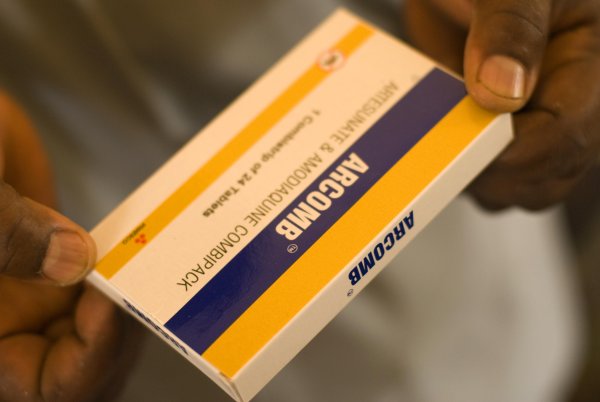Combination therapies important in fight against drug resistance
A study published in the BMC Medicine presents evidence that AS-AQ remains a highly effective malaria treatment in many settings, particularly in sub-Saharan Africa. The study showed that the efficacy of the medicine does, however, vary due to changes in the formulation of the two parts of the ACT, artesunate and amodiaquine.

Artesunate-amodiaquine (AS-AQ) is a widely used artemisinin combination therapy (ACT) - the recommended treatment against falciparum malaria infection. Although still efficacious, there are concerns that in the future, ACTs may not treat patients effectively due to increasing parasite resistance.
One method to preserve the efficacy of this important malaria treatment, and slow down the spread of resistance, is to ensure that all patients receive the correct dose of the drug. The WWARN AS-AQ Dose Impact Study has recently pooled and analysed data from across the world to investigate the impact of current dosing recommendations on the efficacy of this ACT. The team collated 43 studies of antimalarial treatment therapy with AS-AQ, including trial results from more than 9,000 patients recruited between 1999 and 2012.
The study published today in the BMC Medicine presents evidence that AS-AQ remains a highly effective malaria treatment in many settings, particularly in sub-Saharan Africa. The study showed that the efficacy of the medicine does, however, vary due to changes in the formulation of the two parts of the ACT, artesunate and amodiaquine.
“Thankfully, our results highlight that this drug is still working extremely well against malaria, but our analysis suggests that the treatments that combine both AS and AQ into one single pill (a fixed dose) are more effective at treating malaria patients than when the two drugs are given as separate pills at the same time,” says Dr Christian Nsanzabana, WWARN Scientific Coordinator. “This could be caused by a lower dose of amodiaquine in certain formulas or the need to split tablets for younger patients which can cause inaccuracies in dosing.”
"Optimal dosing to fight infections is one way of preserving the efficacy of antimalarials; the ASAQ study group showed that where ASAQ was effective, co-formulation of the treatment was associated with higher cure rates than when the medications were co-administered,” says Dr Elizabeth Juma, Dose Impact Study Group participant from the National Malaria Control Programme, Kenya. “In addition to other benefits, this finding makes a strong case for policies to ensure co-formulation of combination therapies for malaria.”
This is the third dose impact study to come from the WWARN Study Groups. Results released two weeks ago from the AL Dose Impact Study Group confirm that the current recommended dose of artemether-lumefantrine (AL) is still working very well in patients treated for malaria. However, the analyses of data from more than 14,000 patients suggest that a higher dose of AL could potentially further improve treatment results for young children in Asia and underweight children in Africa.
Previous dosing analysis from the Dihydroartemisinin-Piperaquine (DP) Dose Impact Study Group found that small children who receive lower doses of DP, are slower to respond to treatment. The study concluded that policy makers and health workers should consider reviewing current dosing recommendations for DP, particularly for vulnerable groups such as young children and the WHO Treatment Guidelines Committee is currently considering this information.
“It is critical that dose regimens of all antimalarial drugs are optimised so that our best treatments are highly effective in vulnerable populations and continue to work in the future,” says Prof Ric Price, Head of WWARN Clinical Group. “Avoiding suboptimal treatment is a crucial part of the strategy in slowing down the spread of drug resistant parasites”
Resistance is one of the factors affecting antimalarials efficacy, but not the only one. WWARN is working with partners in other study groups to assess all parameters challenging drug efficacy, many being detectable only after drug registration when large number of patients have been treated and relevant information can be assembled to provide sufficient evidence to policy makers.
Find out more about other WWARN Study groups and how to get involved.
Publication details
The Worldwide Antimalarial Resistance Network (WWARN) AS-AQ Study Group. The effect of dosing strategies on the therapeutic efficacy of artesunate-amodiaquine for uncomplicated malaria: a meta-analysis of individual patient data. BMC Medicine 2015 13:66. Published 31 March 2015 doi: 10.1186/s12916-015-0301-z.
Related publications:
Worldwide Antimalarial Resistance Network (WWARN) AL Does Impact Study Group. The effect of dose on the antimalarial efficacy of artemether-lumefantrine: a systematic review and pooled analysis of individual patient data. The Lancet Infectious Diseases 2015; D-14-00566R1; DOI 10.1016 S1473-3099 (15)70024-1
The Worldwide Antimalarial Resistance Network (WWARN) DP Study Group (2013) The Effect of Dosing Regimens on the Antimalarial Efficacy of Dihydroartemisinin-Piperaquine: A Pooled Analysis of Individual Patient Data. PLOS Med 10(12): e1001564. DOI:10.1371/journal.pmed.1001564

